€ 1.5 million donation: Germany and WHO join hands to deliver life-saving support to drought-affected communities
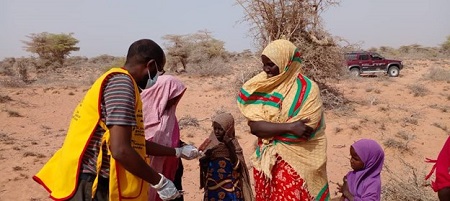 An outreach workers reaches out to a family in remote area of State of Galmudug, Somalia. Credit: WHO Somalia/Fouzia Mogadishu, 1 December 2022 – The Government of Germany has donated €1.5 million to the WHO country office in Somalia with the aim of providing life-saving health care to the people of Somalia living in dire humanitarian conditions. Health is one of the priority areas among humanitarian partners during the ongoing historic drought.
An outreach workers reaches out to a family in remote area of State of Galmudug, Somalia. Credit: WHO Somalia/Fouzia Mogadishu, 1 December 2022 – The Government of Germany has donated €1.5 million to the WHO country office in Somalia with the aim of providing life-saving health care to the people of Somalia living in dire humanitarian conditions. Health is one of the priority areas among humanitarian partners during the ongoing historic drought.
This funding will be used to provide essential health care to children and women living in hard-to-reach drought affected areas. It will; however, benefit the wider population as well with long-term measures such as routine immunization. Germany seeks to support Somalia and WHO not only by providing funds but also by extending technical support by deploying a number of German experts to the WHO country office to help with their operations. For the German Government, health globally, but particularly in Somalia, with the current drought, is one of the key areas of its humanitarian engagement.
“This is why we are supporting Somalia with an additional €1.5 million through WHO within a wider scale-up of €10 million for WHO globally,” stated German Ambassador Sebastian Groth, adding that “Germany stands by Somalia for helping with its immediate needs as well as long term overall improvement in health.”
WHO will deploy trained community-based health workers in hard-to-reach areas who will go house to house and render community-based essential health and nutrition interventions. In addition, WHO will support community outreach services for the treatment of sick children, and care for pregnant and lactating women, including vaccination against preventable diseases for children and women of childbearing age. These outreach centres will distribute blanket micronutrient supplements, such as iron tablets, vitamin-A and deworming tablets to improve the immunity of these vulnerable populations to prevent them from diseases that are avoidable.
In recognition of the continued partnership between WHO and Germany, the WHO Representative to Somalia Dr Mamunur Rahman Malik said that, “We are racing against time to try to prevent major outbreaks of cholera or measles. We have seen, deaths and diseases thrive when hunger and food crisis prolong. This is a timely support to our country office from one of the major donors of WHO globally. On behalf of WHO, I express our utmost appreciation to the Government of Germany for its timely support for the people of Somalia who are facing the risk of famine in one of the most fragile and broken health system setting.” He added, “We will see more people dying from the disease than from hunger and malnutrition combined if we do not act now. The cost of our inaction will mean that children, women and other vulnerable people will pay with their lives while we hopelessly, helplessly witness the tragedy unfold. As we have seen during our collective emergency response operations for COVID-19, early action and delivery of high quality and evidence-based interventions can lead to protecting health and well-being, even if the health system is fragile.”
Background information
WHO has been able to reach nearly 3.3 million people, about 45% of the people who are in need, with life-saving treatments, essential health and nutrition interventions. These services are being delivered through over 2164 community health workers, 148 mobile outreach team, 64 stabilization centres and 280 primary health care centres in the drought-affected districts. Somalia is currently facing one of the most severe droughts in its history, with a looming famine and possibility of severe loss of life due to hunger, malnutrition, and disease. Currently, 7.8 million people are affected and 1.1 million are displaced (on top of 2.5 million which were already displaced) as they are in search of food, water, shelter, healthcare and any assistance available. Furthermore, the drought is increasing endemic-prone diseases, putting millions at risk. For example: 3.5 million persons lack sufficient access to water; and 6 million continue to face severe food shortages, with approximately 1.4 million children facing acute malnutrition, including 329 500 likely to become severely malnourished. Moreover, as of 31 October 2022, a total of 11 332 suspected cases of cholera, 15 143 cases of measles and 96 063 cases of acute diarrhoeal disease have been confirmed in drought-affected areas since January 2022.
For additional information, please contact:
Judith Gosmann
Attaché, Somalia Unit
Kyle DeFreitas
External Relations Officer
Fouzia Bano
Communications Officer
WHO Somalia calls for breaking the barriers to ensure equal access to HIV services
 Credit: HIV test kit, WHO Somalia/Fouzia
Credit: HIV test kit, WHO Somalia/Fouzia
Mogadishu, 1 December 2022 – The World Health Organization (WHO), in partnership with Federal and State ministries of health, has managed to keep the human immunodeficiency virus (HIV) and acquired immunodeficiency syndrome (AIDS) prevalence in Somalia on a steady decline, from above 1% in 2013 to 0.10% in 2022, thus keeping the country since 2014 classified as a low-level HIV epidemic country.
Out of over 3978 recorded HIV patients in Somalia who are on antiretroviral (ARV) treatment, 87.3% were virologically suppressed, that is, the quantity of virus had been brought down below the threshold required to gauge the treatment as being effective. Monitoring of viral suppression in HIV-positive patients on antiretroviral treatment (ART) is important both for optimizing patient health and for reducing risk of HIV transmission. Mortality and morbidity rates in ART patients are critically dependent on viral suppression and viral suppression in ART patients is critical to reducing HIV incidence at the population level. This success rate has been achieved on account of WHO’s close monitoring of the HIV/AIDS situation in the country including ensuring equitable access to patient care, close follow up of patients who are on ART and regular monitoring of clinical conditions of the HIV/AIDS patients.
On the occasion of World Aids Day 2022, commemorated this year under the theme- “Equalize”, WHO joins its partners to call upon the global leaders and citizens to boldly recognize and address the inequalities which are holding back progress in ending AIDS; and equalize access to essential HIV services particularly for children and key population groups who are at risk of contracting HIV/AIDS.
In its support to HIV/AIDS response activities in Somalia, WHO has worked with national and international stakeholders to provide training to national staff for HIV testing and counselling; treatment, including anti-retroviral therapy (ART); conducting periodic sentinel surveys to assess trends in the levels of the infection in the population; and in conducting annual HIV epidemic projection modelling exercises. In addition, WHO has supported capacity-building for monitoring HIV/AIDS treatment, including the measurement of the quantity of the HIV virus for patients on ART, as well as for conducting cohort analyses of patient outcomes. Furthermore, WHO has supported regular external quality assurance (EQA) assessments on the accuracy of HIV testing conducted by national staff at various HIV testing facilities across the country, including for voluntary counselling and testing, tuberculosis (TB), antenatal care and child delivery service outlets, as well as those who test blood prior to transfusion.
WHO’s Medical Officer for HIV/AIDS Dr William Rogers Busulwa, while appreciating the reported decline in the prevalence of AIDS in Somalia, said that, “We still have a lot of ground to cover to ensure that communities and especially high-risk segments of society are regularly and consistently engaged for raising awareness about the deadly disease, in addition to infected people are given equitable means of getting treatment without any fear of ostracization.”
HIV prevalence in Somalia
Somalia was classified as being a low-level HIV epidemic in 2014, but for 10 years prior to that antenatal HIV rates had been marginally above 1% in Somaliland, with this area classified as having had a generalized HIV epidemic. The HIV prevalence among the general population has seen statistically on a significant decline, with the most recent 2018 sentinel survey showing that antenatal HIV prevalence dropping to 0.15% in Somaliland, 0.17% in Puntland and 0.04% in South Central Somalia. The mean antenatal HIV prevalence for all 3 areas was 0.10% – positive signs that the disease continues to be on the decline.
For TB patients, HIV rates have also been on the decline, even as the coverage of HIV testing among them has increased to include more peripheral TB facilities. This prevalence declined from 5% in 2011, when systematic testing was launched, to 3.33% in 2014 and finally to 0.60% during January to June 2021.
Despite challenges of accessibility, ongoing drought, and security, WHO data reveal that by June 2022, out of recorded 3978 patients receiving ART, 82.7% of whom were already on the newer and more effective dolutegravir (DTG) based regimens. ART coverage of the estimated people living with HIV went up from 34.7% in 2018 to 44.7% in 2021. The data further reveal that during 2021, 49.6% of all patients enrolled on ART for at least 6 months received an HIV viral load test and 87.3% of these were virologically suppressed, that is, the quantity of virus had been brought down below the threshold required to gauge the treatment as being effective. This virological suppression increased from 69.1%.in 2018 when the service was first introduced, and from 80.7% in 2020.
For additional information, please contact:
Kyle DeFreitas
External Relations Officer
Fouzia Bano
Communications Officer
Related links
/somalia/news/world-aids-day-reaching-more-people-with-hiv-services-and-reducing-inequalities.html
WHO, the International Humanitarian City of Dubai and Government of United Arab Emirates extend life-saving support to twin-blast victims of Mogadishu
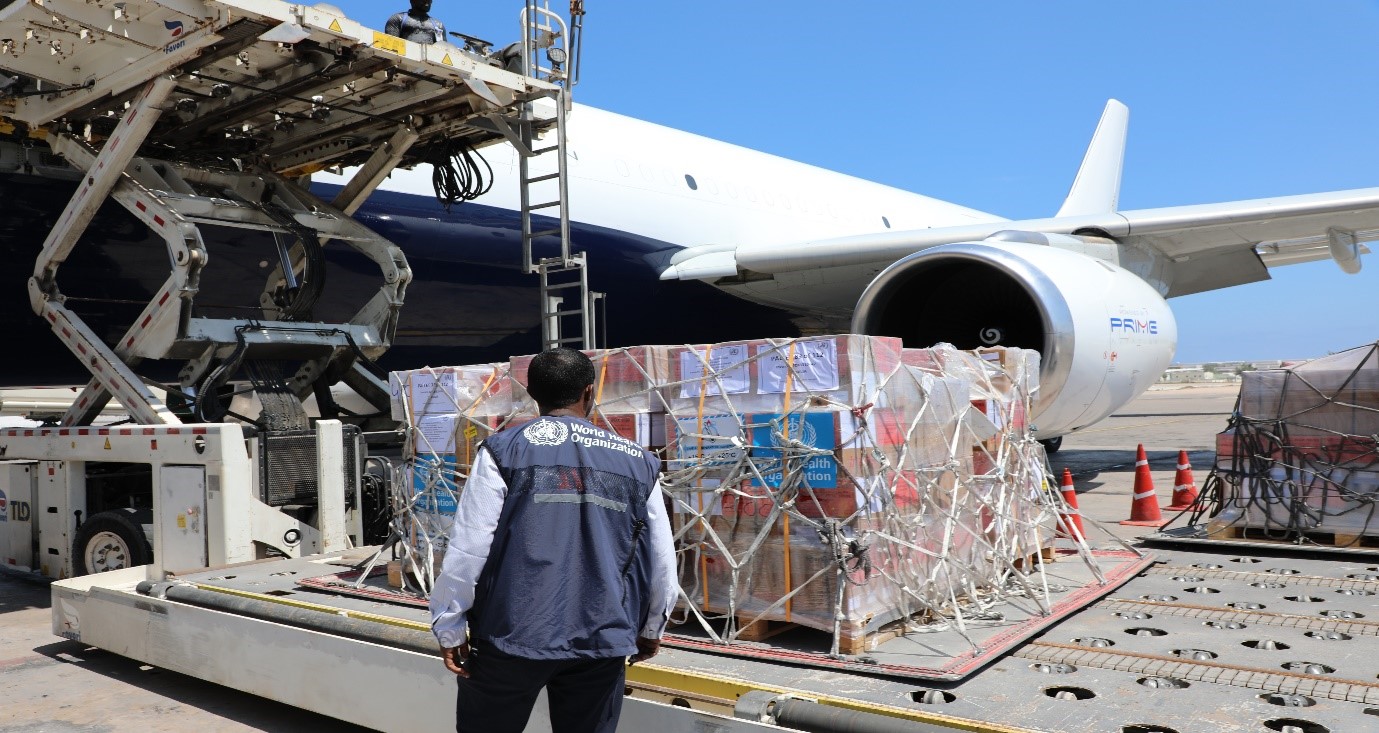
Mogadishu, 13 November 2022 – The World Health Organizations (WHO) Somalia country office, received over 38 metric tons of life-saving medical supplies on 8 November to help support the victims of the twin blasts that shook Mogadishu, the capital city of Somalia on 29 October.
The International Humanitarian City of Dubai Government and the Government of the United Arab Emirates generously offered a charter flight from WHO’s Dubai Logistics Hub to Mogadishu to transport these medicines and infusions urgently needed to care for victims of the blast and ensure an uninterrupted supply of essential medicines to support emergency medical teams. These supplies are in addition to 39 metric tons of other trauma care supplies that WHO brought it urgently from its Dubai Logistic hub and handed over to the Federal Ministry of Health on 5 November 2022 in the presence of the Minister of Health of Federal Government of Somalia, HE Dr Ali Hadji Adam Abubakar).
The twin blasts, reportedly took the lives of over 100 people, while critically injuring over 300 more. Immediately after the blasts and in record time, WHO was able to bring in these supplies to Mogadishu, Somalia from its logistic hub in Dubai. These supplies, ideal for trauma care, will be sufficient to treat over 2500 patients with multiple injuries, burns and other blast wounds.
These supplies worth US$ 750 000 are life-saving support for Somalia during this difficult time and WHO remains thankful and grateful to the International Humanitarian City, the Dubai Government, His Highness Sheikh Mohammad Bin Rashid Al Maktoum and the Government of the United Arab Emirates for providing this airbridge for transportation of these emergency medical supplies to Mogadishu, Somalia.
Expressing his personal gratitude, WHO Regional Director for the Eastern Mediterranean Dr Ahmed Al-Mandhari, said, “These emergency medical supplies are critically needed to ensure that essential medicines and infusions are available in Mogadishu to care for victims of the blast and prevent further loss of life. Thanks to the support of the Dubai Government, the International Humanitarian City, and the Government of the United Arab Emirates, WHO’s logistics hub in Dubai were able to rapidly respond to this emergency in Somalia as well as to other acute health emergencies around the world to deliver humanitarian aid to those in greatest need, in line with our collective regional vision of “Health for all, by all”.
For additional information, please contact:
Kyle DeFreitas
External Relations Officer
Fouzia Bano
Communications Officer
Note to editors
Please see the links below for additional information on recent support:
Short video message by WHO Representative to express sympathy and solidarity with blast victims
Tweet by the Federal Minister of Health Dr Ali Haji thanking WHO for the support
World Polio Day 2022 and beyond: a healthier future for mothers and children in Somalia
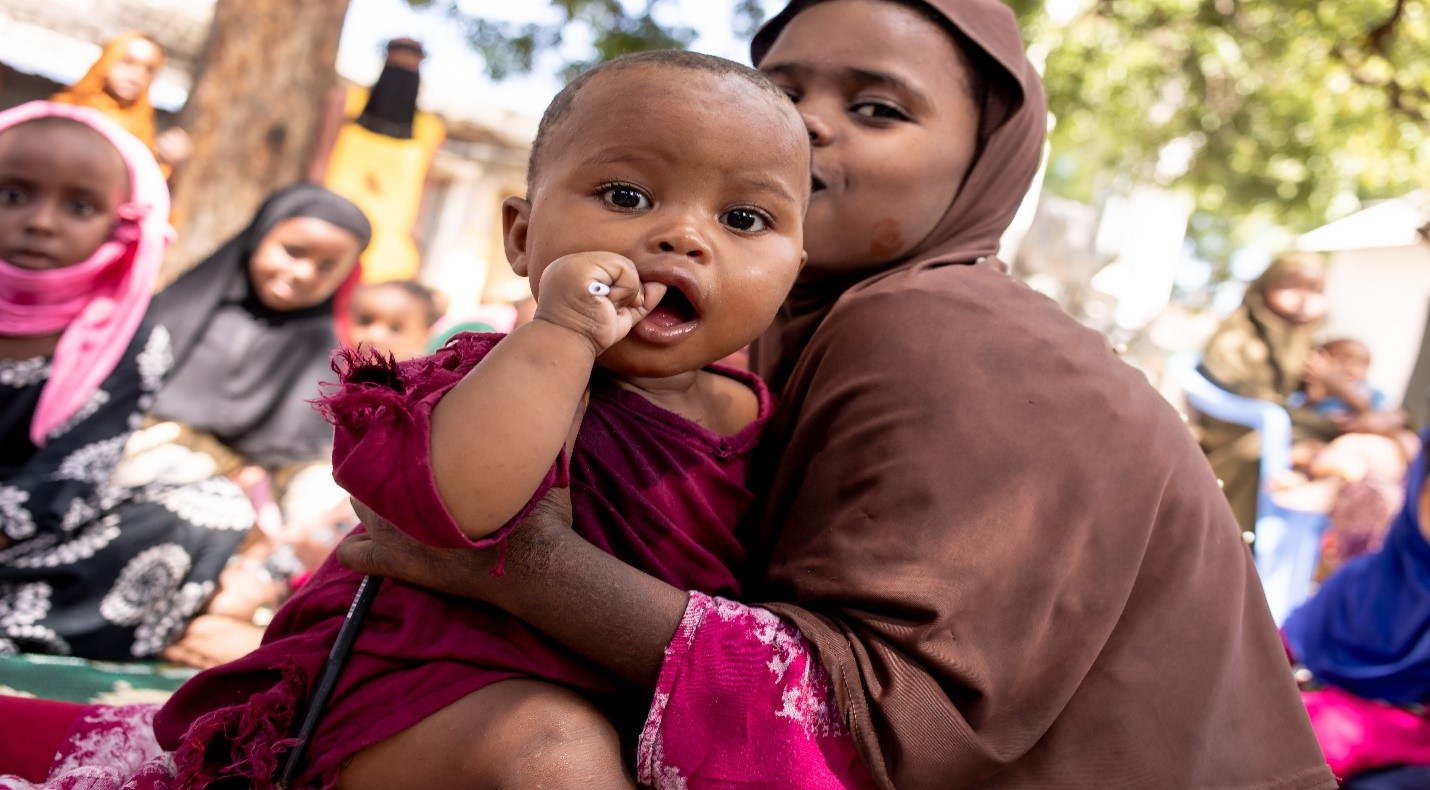 A mother brings her child to get polio vaccination on first day of campaign in Banadir region, Somalia 22 October 2022
A mother brings her child to get polio vaccination on first day of campaign in Banadir region, Somalia 22 October 2022
Mogadishu, 24 October 2022 – Living by its principle of ‘delivering on a promise’, WHO and the Government of Somalia are commemorating the World Polio Day by launching fifth round of this year’s sub-national vaccination campaign across high-risk areas to keep the country free from wild polio virus and ensure every child in this country lives a healthier life.
The World Polio Day was established by Rotary International over a decade ago to commemorate the birth of Jonas Salk, who led the first team to develop a vaccine against poliomyelitis. Use of this inactivated poliovirus vaccine and subsequent widespread use of the oral poliovirus, developed by Albert Sabin, led to the establishment of the Global Polio Eradication Initiative (GPEI) in 1988.
Though the country is free from wild polio virus, a rare strain of polio-called the vaccine-derived polio virus continues to circulate in the country owing to poor immunization coverage amongst the children living or residing in hard-to-reach and partially inaccessible areas. So far, 4 children have been identified with circulating vaccine-derived polio virus type 2.
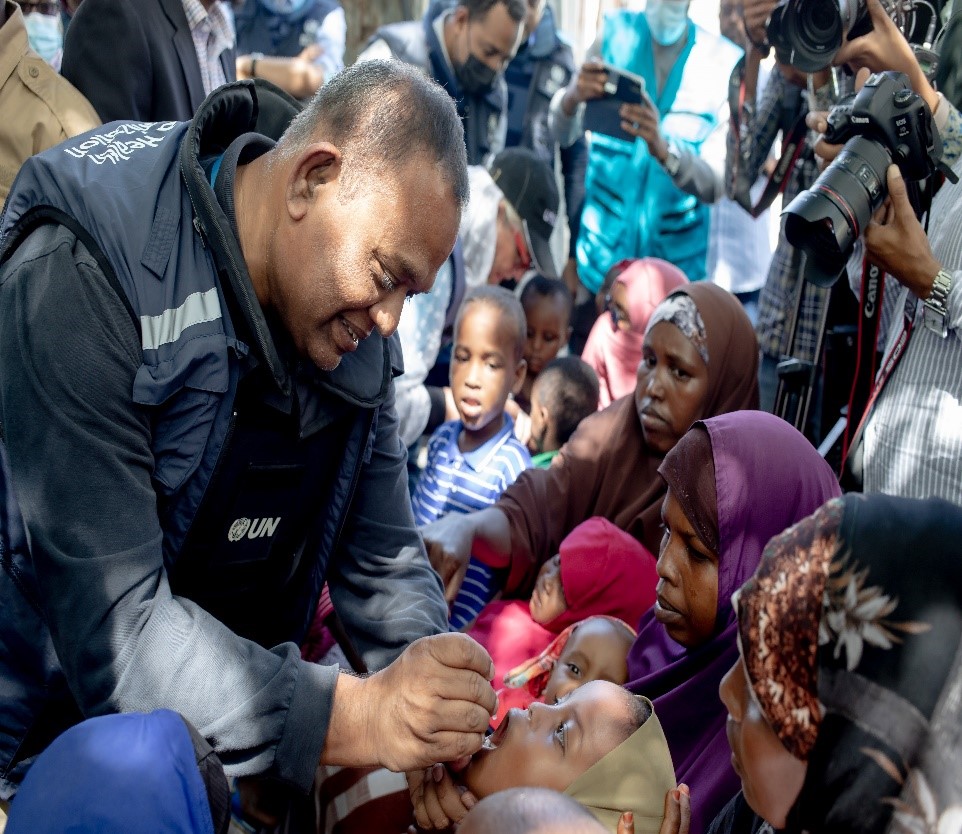 Dr Mamunur Malik, WHO Representative in Somalia administering polio vaccine in Banadir region, June 2022Facing multiple outbreaks of cholera and measles, amid an unprecedented drought and an ongoing pandemic (COVID-19), WHO Somalia in collaboration with its partners has helped the federal and state health ministries to complete four successful polio campaigns this year. About 3.6 million children under 5, including 327 467 zero dose children (first time vaccinated) and an additional 2.4 million children aged between 5 and 10 years were vaccinated during these campaigns. The completed polio campaigns include 2 rounds of country-wide national immunization days (NIDs) conducted in March and June 2022, while another 2 rounds of sub-national immunization days in selected high-risk districts were completed in February and August 2022. The fifth round has coincided with this year’s World Polio Day and is currently under way in 79 districts in Banadir, Galmudug, Hirshabelle, South West and Jubaland states targeting 4.75 million under-10 years of age children.
Dr Mamunur Malik, WHO Representative in Somalia administering polio vaccine in Banadir region, June 2022Facing multiple outbreaks of cholera and measles, amid an unprecedented drought and an ongoing pandemic (COVID-19), WHO Somalia in collaboration with its partners has helped the federal and state health ministries to complete four successful polio campaigns this year. About 3.6 million children under 5, including 327 467 zero dose children (first time vaccinated) and an additional 2.4 million children aged between 5 and 10 years were vaccinated during these campaigns. The completed polio campaigns include 2 rounds of country-wide national immunization days (NIDs) conducted in March and June 2022, while another 2 rounds of sub-national immunization days in selected high-risk districts were completed in February and August 2022. The fifth round has coincided with this year’s World Polio Day and is currently under way in 79 districts in Banadir, Galmudug, Hirshabelle, South West and Jubaland states targeting 4.75 million under-10 years of age children.
To maintain its polio free status, WHO and the Government of Somalia owes this sustained marathon effort to their trusted partners like UNICEF, Rotary International, Bill & Melinda Gates Foundation, the United SCentre for Disease Control and Prevention, and United States Agency for International Development (USAID). Together with WHO, these partners have been helping to not only raise the immunization profile of the country but also introduced a polio transition plan to switch the focus from polio-only efforts to improved routine immunization, data-driven surveillance, risk communication and community engagement, and integrated health outreach activities. This WHO-led transition is proving its utility as the infrastructure and platforms established under polio programme is now helping to save many precious lives across Somalia during the ongoing pandemic and multiple outbreak responses.
Somalia’s polio transition plan is capitalizing on the existing network to improve routine immunization strengthen surveillance and outbreak response activities as well as to improve access to healthcare for marginalized section of the community using the primary health care system. The plan will ensure a better, fairer, and healthier future for mothers and children in the country.
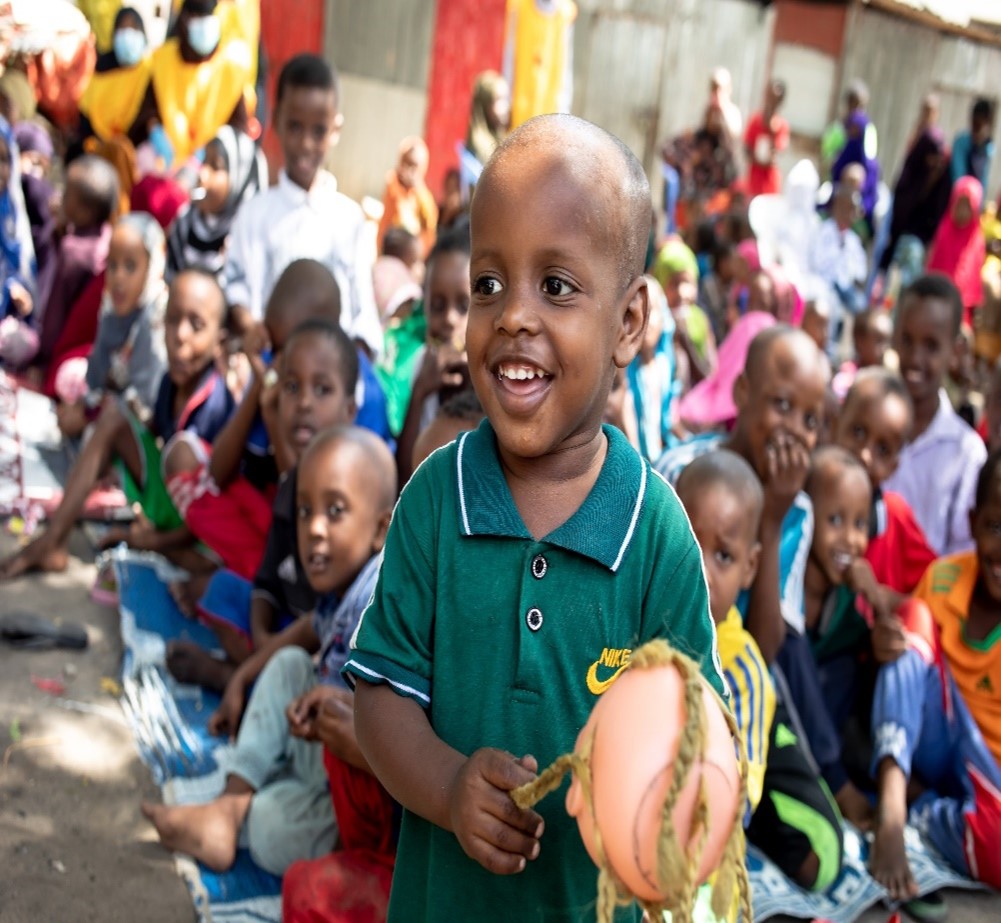 Responsible parents bring their children for polio vaccination site in Banadir region, Somalia during the ongoing supllementary national immunization day, October 202“We are thankful to WHO for helping us conduct a polio campaign in 11 hard to reach districts this year. This was the first-ever campaign in these areas in the past 10 years and helped to vaccinate almost 52% of previously unvaccinated children in these districts. We are confident of ‘delivering on our promise’ of keeping every child safe from all vaccine preventable diseases in our country,” said polio focal point for Somalia Mr Mohammed Nur.
Responsible parents bring their children for polio vaccination site in Banadir region, Somalia during the ongoing supllementary national immunization day, October 202“We are thankful to WHO for helping us conduct a polio campaign in 11 hard to reach districts this year. This was the first-ever campaign in these areas in the past 10 years and helped to vaccinate almost 52% of previously unvaccinated children in these districts. We are confident of ‘delivering on our promise’ of keeping every child safe from all vaccine preventable diseases in our country,” said polio focal point for Somalia Mr Mohammed Nur.
WHO Somalia has faced many challenges to come this far in its fight against polio and is committed to help the Somali health system qualify to the next level of sustenance by maintaining the gains achieved during the implementation of polio programme.
Dr Ali Ben Break, the acting Team Lead for polio programme at the WHO country office said, “As the world is expecting realization of polio eradication promise in the coming years, it will be imperative to ensure smooth integration of its experiences, lessons and health assets in high risk and endemic countries, especially in a post-pandemic world. WHO Somalia team had adopted to this changing reality more quickly than perhaps many other countries. Our team has shown the resolve and resilience to work on multiple fronts in perhaps one of the most difficult places on the face of earth and will continue to save the humanity through our integrated and professional approach.”
For additional information, please contact:
Kyle DeFreitas, WHO Somalia External Relations Lead,
Fouzia Bano, WHO Chief of Staff ai, Communications Officer,
-----------------
Related links
World Polio Day 2022 and Beyond: A healthier future for mothers and children (who.int)
WHO Regional Office | Expanded Programme on Immunization | Priority areas | Somalia site


